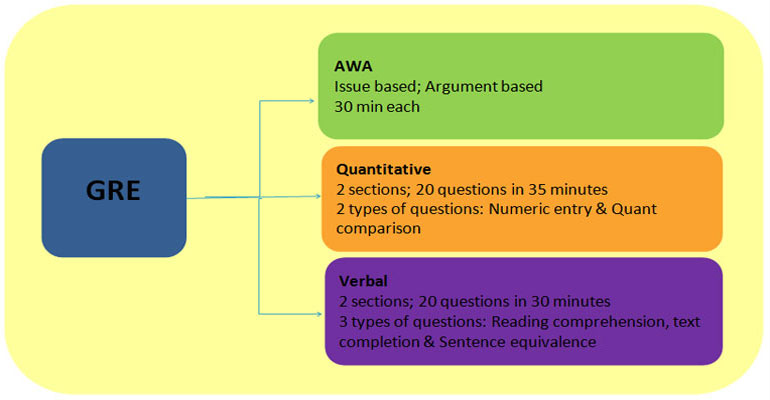
So, you decided to go to a university in the United States and opened a list of required documents. You wrote your curriculum vitae and motivation letter, received recommendations from your supervisors. Now you have to pass the exams. Any university will require a language certificate and GRE certificate. If with language exams we are more or less understandable, we are prepared for them from school, the GRE exam for many Russian graduates is difficult because there is no analogue in Russia.
How hard is the gre test
The GRE (Graduate Record Examination) is an examination that is required to enter a postgraduate program in the United States. The exam checks the general erudition and logic of the graduate, as well as his professional competence.
There are two types of examination – general and subject (specialized). The first one checks basic knowledge in mathematics and English, the second one – highly specialized knowledge. In most universities, only the general test is required. Subject testing may be required in top programmes in mathematics, physics, biology and psychology. We will focus on the general test in more detail.
Exam structure
General test consists of three parts: verbal reasoning, quantitative reasoning, analytical writing.
Verbal reasoning (verbal ability test)
This part tests the student’s ability to think verbal. First, the participant is asked to read a short popular science text and choose the right answers to a number of questions. The next task is to insert the missing words in the text. For each skip, three answers are offered, one of which is correct. Here, first of all, the candidate’s vocabulary is tested: you need to know the terms and remember many adjectives and adverbs. In the last block of language tasks, you need to add several words to the sentence. From the list of words, you need to select two suitable ones. As a rule, all proposed words are very close in meaning, you need to find the word most used in this context. For example, among the variants there may be synonymous adjectives eccentric (eccentric, eccentric, strange – a word with a negative hue), original (authentic as well as outstanding, bright – usually a positive characteristic). innovative, cutting-edge.

Tips for training:
- Preparation should focus primarily on vocabulary.
It is useful to look at thematic lists of adjectives. It is better to look at the dictionaries of their use at once. Firstly, a word in context is always easier to remember, and secondly, it is the only way to feel the difference between synonyms.
2) Special attention should be paid to introductory words that organize the text. Often the meaning of the whole sentence depends on them. Let’s consider two phrases:
As I was a philologist, I…
Although I was a philologist, I…
There seems to be little difference, and yet the two sentences are the opposite in meaning. The logical extension of the first one is “As I was a philologist, I knew English very well” and the second is “Although I was a philologist, I didn’t know English at all”. Complementing the sentence, a person is often in a hurry and does not pay attention to well-known service words. It is on this most often and catch the surrender.
Quantitative reasoning.
This part of the test practically does not go out of limits of a Russian school mathematics course. In total in section of 20 tasks among which some on arithmetic, algebra and geometry. Unusual for Russians can appear tasks on statistics.
Strange as it may seem, the language is the most difficult one in the mathematics section. Tasks in themselves are not very difficult, but the whole terminological apparatus must be learned in English, so as not to be afraid at the sight of strange “prime numbers” (prime numbers), “divisibility” (separability), “remainder” (remainder).
Analytical writing (academic writing)
The analytic letter is the final part of the test. In one hour the submitter should write two essays: “problematic” and “argumentative”. In the problem essay, one should think about the question posed. The full list of possible topics is published on the official website of the exam. They may be, for example, as follows: “Nowadays, people rely more and more on technical devices. Doesn’t this affect their ability to think for themselves?”; “Scandals are necessary because they draw public attention to current issues”, etc. В
The argumentative essay should analyze the proposed thesis, identifying its logical weaknesses and bring its arguments to support it or vice versa.
Tips for prep for gre:
Analytical writing tasks are similar in structure to part C of the Russian USE, and one should prepare for them in the same way.
- It is worth looking at the published lists of topics and thinking over the answers. The more you look through the lists, the more confident you will feel in the exam. In addition, you will save time on reflection and be able to read and edit the text more carefully.
- You need to prepare a structural “framework” of the text in advance. Be sure to formulate for yourself:
-Sentence of an introduction that retells the topic in other words;
-Input phrases for each of the arguments (for example, for instance, to be more specific),
-bindings that logically connect different thoughts (apart from that, what is more, besides)
-In conclusion, to sum up.
Where can I take the exam and how much does it cost?
You can take the exam in eight major Russian cities: Moscow, St. Petersburg, Volgograd, Krasnoyarsk, Novosibirsk, Syktyvkar, Yekaterinburg and Vladivostok. Passing the exam costs $195.
How hard is the gre test?
The GRE exam is, of course, quite complicated. It is not easy to pass for native English speakers, and for foreigners it is even harder. But that is why such a certificate in your portfolio will be your huge advantage not only in the USA, but also in Russia. So it is worth to work and pass it all the same.